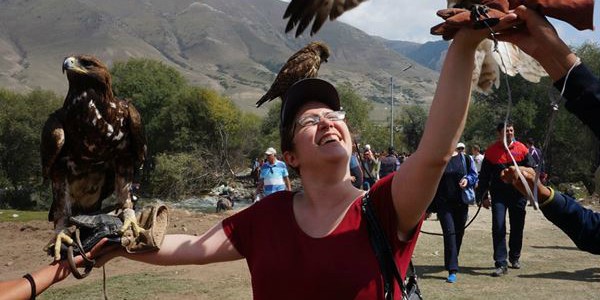Bonnibelle Leeds is a senior in the Department of Bioengineering at UW pursuing the team design capstone track. For her capstone project, she is optimizing a narcotic identification and disposal device under the guidance of Dr. Lance Patak at Seattle Children’s Hospital.
Bonnibelle is also an undergraduate researcher in Dr. Wendy Thomas’s laboratory where she is designing a Matlab program to automatically generate oligo sequences that do not form homo- or heterodimers. Outside of school, Bonnibelle volunteers for the robotics program at Franklin High School and for Planned Parenthood. After graduation, she is planning to attend graduate school in Molecular Engineering at UW.
“One of the things that I struggled with most at UW is the competitive environment. I didn’t expect that. It’s not like people try to throw each other under the bus, at least in my experience. Everyone I know tries to score higher than the average and feels bad about themselves if they don’t. Of course, it’s impossible for everyone to score above average the same time, which means that at least half of the class feels bad after getting an exam back — probably more, since people who are *only* slightly above average often feel like they should have outperformed others even more.
That was new to me because I came directly to BioE from a community college. There, everyone just tried to do well and curves only ever improved your score. There wasn’t so much pressure to get into graduate or medical schools. I didn’t even learn to look at averages until I got to UW because before they didn’t matter.
To continuously try to score better than everyone around you, and to think that it’s a reflection on who you or they are as a person, is just unhealthy. Grades and test scores are an easy, quantitative way of assessing our skills at a particular subject, but they do not define who we are or what we are capable of. Thinking that they do means that we overlook and underdevelop other important aspects of our intellect and humanity, like empathy, kindness, and accomplishments in lab or volunteering.
I am still struggling to break out of that thought process, to think ‘Wait, I don’t actually have to buy into this system. I don’t have to look at the average and compare myself to everyone else.’ Instead, I try to ask myself, ‘Did I do as well as I thought I could? Did I study as much as was practical and healthy given everything else that was happening in my life?’
I have struggled with anxiety and perfectionism for most of my life. In high school, I was such as perfectionist that I would spend hours writing a single paragraph. I would have to write each essay with my tutor saying, ‘It’s okay! You can do this! Keep going!’ just to get me through it. The competitiveness at UW that makes it so easy to overcompare yourself to others definitely exacerbates my anxiety and perfectionism.
I think that the most important thing that I would say to anyone coming into the department or to UW in general is to focus on yourself. Instead of comparing yourself to other people and averages on exams, ask yourself, ‘Did I do my best?’ Don’t focus on all the extracurricular activities that people around you are doing. Just do your own best because it will drive you insane to try to do someone else’s best. You are all different and that is a good thing. Love and grow from each other.”


